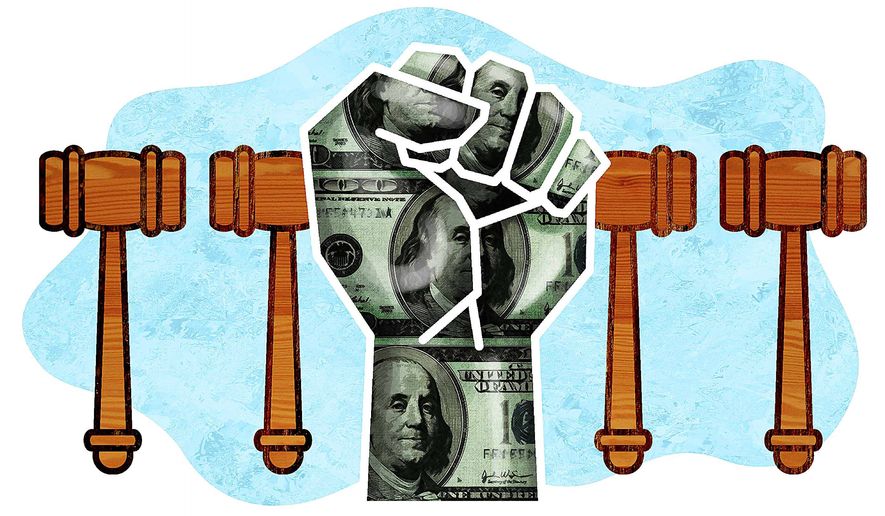OPINION:
Public employee unions are anxious about the upcoming Supreme Court argument in Friedrichs v. California Teachers Association (CTA). The Friedrichs plaintiffs object to having $1,000 taken out of their paychecks each year to support CTA because they disagree strongly with CTA’s bargaining positions. They have asked the court to overrule Abood v. Detroit Board of Education (1977), a decision that sanctioned the practice of compelling “agency fee” payments from non-union members.
Friedrichs bears the telltale signs that it could be a blockbuster. Namely, a familiar chorus has arisen that Chief Justice John G. Roberts’ legacy will be tarnished if the court reaches a “political” decision to overrule an earlier case.
This campaign is complete with misleading sloganeering about what is at issue. One widely published opinion piece says the court is merely considering “whether public sector unions may ask employees who aren’t members, but who benefit from the wages and benefits the union negotiates, to chip in for the costs of those negotiations.” But CTA doesn’t “ask” teachers to “chip in.” The state takes money from their paycheck before it hits their bank accounts; they have no choice in the matter.
Here are some other things you won’t hear about the Friedrichs case from the unions or their supporters:
• Abood is a First Amendment outlier. No one can be forced to join a public employee union. Under Abood, however, non-members can be forced to pay an agency fee to the union just as if they were paying dues.
Abood recognized that compelling financial support for unions raises First Amendment concerns: Non-members are being forced to subsidize the union’s positions on matters of intense public concern. For example, CTA’s bargaining has resulted in staggering levels of pension and health care liabilities. A Los Angeles court recently found that California’s iron-clad tenure protections caused classroom conditions in low-performing schools to reach a point that “shocks the conscience.”
Yet Abood said this compulsion was justified for “common cause” reasons: namely, achieving “labor peace” (an odd concern in a civil service setting) and avoiding “free riding” by non-members who benefit from bargaining. By elevating collectivist goals over individuals’ speech rights, Abood stands out like a sore thumb among the many decisions striking down compelled speech or association. The general rule is that individuals control their own speech and cannot be forced by law to support groups whose positions they oppose.
Moreover, Abood justified its “common cause” rationale by claiming it should defer to congressional policy in the National Labor Relations Act relating to private unions. But the act does not even apply to state and local government employees. Rather, state law controls whether and how they can unionize, and only a minority of states even permit compelled agency fee arrangements. Thus, the payments the unions claim are essential to their survival are illegal in many states. Another interesting historical fact: President Franklin D. Roosevelt, who signed the National Labor Relations Act, believed that public employees should not even be allowed to unionize. History is not on the unions’ side.
• None of the current justices endorse Abood’s rationale. In 2014, the Supreme Court’s Harris v. Quinn case offered a preview of the arguments in Friedrichs. The majority concluded it did not need to overrule Abood to decide that case, and it struck down Illinois’ agency fee regime for home health care workers in a 5-4 decision. But the majority left little doubt that it thought Abood’s rationale could not survive the “exacting scrutiny” normally applied to compelled-speech claims.
Justice Elena Kagan, writing for the minority, argued for the survival of Abood’s result, but not its rationale. In a major shift, she argued that Abood’s regime promotes efficient management of government employees, so it should survive less exacting First Amendment scrutiny under a decision called Pickering v. Board of Education (1968). But that case considered only whether a school teacher could be disciplined for speaking out on matters of public concern — it didn’t deal with union fees at all.
In their Friedrichs briefs, the unions took a similar approach, generally refusing to defend Abood on the merits, while at the same time arguing it should not be overruled because it has been around for nearly 40 years (which is not long in Supreme Court time). All of this misdirection signals that Abood is on life support.
• Allowing choice is not a death knell for public unions. Public employee unions survive, and even flourish, in states that outlaw compelled agency fees. Indeed, federal law forbids federal employee unions to impose an agency fee. Where is the outcry that those federal unions can’t survive?
Doomsday talk about free-riding teachers not paying their “fair share” can’t be squared with the state of luxury in which CTA and other wealthy unions now operate. The Friedrichs complaint shows that the state currently funnels roughly $200 million per year to CTA in union dues and agency fees, of which the union claims nearly $125 million is needed for bargaining (even though collective bargaining agreements last for several years). That leaves another $75 million per year for political contributions and lobbying. This money-making machine allows CTA to dominate California politics.
With this much gravy, CTA privately admits to its members that it can survive a defeat in Friedrichs. In a PowerPoint demonstration titled “Not if but when: Living in a world without fair share,” CTA promised members that “[p]lanning, organizing, and preparedness will ensure our continued organizational strength and survival.”
The court should correct Abood’s mistake and end the unfair confiscation of public employees’ wages for causes they do not support.
• Bradley Benbrook practices law at Benbrook Law Group in Sacramento, Calif. His firm filed an amici brief for constitutional law professors in Friedrichs.




Please read our comment policy before commenting.